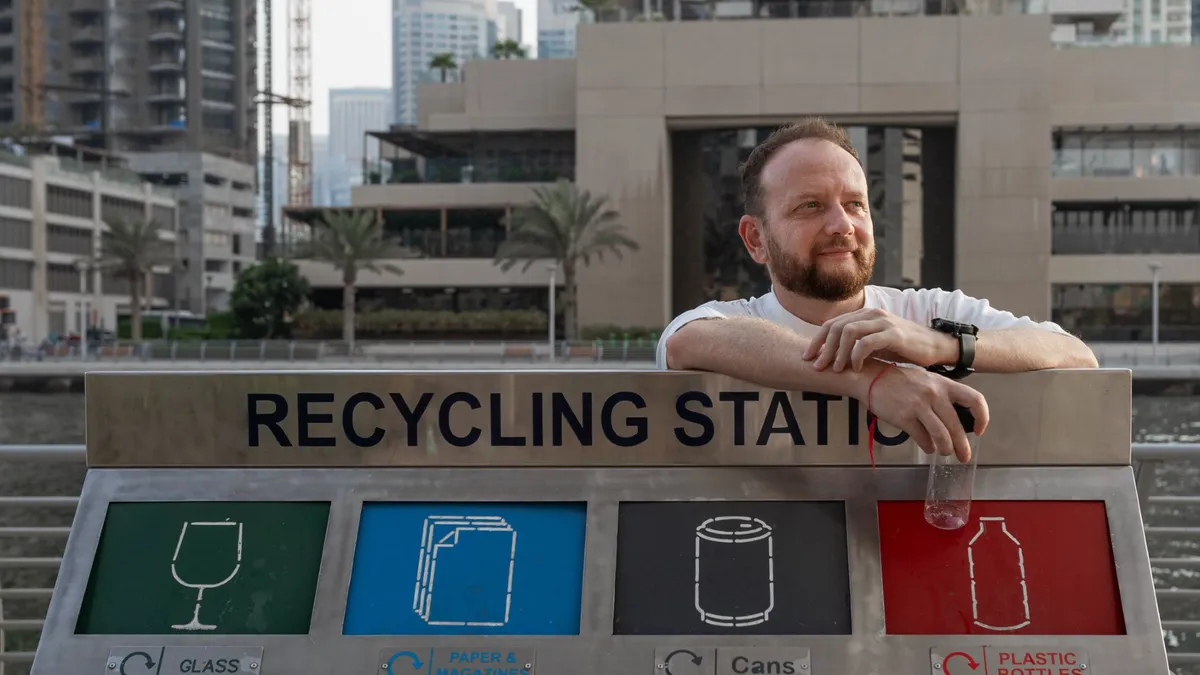The developers of Binpong, a new recycling app that launched in November, see gamification as a key way to motivate people to recycle more frequently when they’re out and about.
Binpong, which allows users to collect and redeem points each time they recycle in their communities, aims to “create a fun, community-driven experience that encourages positive behavior change,” said Sergey Shayakhmetov, the app’s founder and CEO. Shayakhmetov has a background in the tech sector and has previously worked on projects addressing AI in healthcare diagnostics and the environmental impacts of cryptocurrency mining.
Binpong is a map-based app meant to guide users to the nearest recycling bin or facility and prompts users to take a photo of the item they’re recycling. After dropping the item in the bin, users earn “pongs,” or points they can redeem for rewards like discounts on taxi rides and online games. Users can also convert their points into donations to organizations like the Arbor Day Foundation. The app uses AI as part of its verification system, which helps determine that the item was recyclable at that location and that the user was present at the location they indicated on the app.
Shayakhmetov said people in the United States and around the world want to be more environmentally sustainable, but there’s still a lack of public engagement and awareness about how to recycle or where to recycle when they’re away from home. “Despite having a network of recycling facilities, many people in the U.S. either have no idea where to find them or see them as inconveniently located,” he said.
Binpong joins a group of other free recycling-related apps meant to address consumer confusion over recycling rules and give users incentives for correctly recycling. Last year, Oscar Pocket launched its AI-powered chat app to guide users through recycling-related questions and offer rewards for recycling at places like sports stadiums. The Recycling Partnership also rolled out Recycle Check last year, which uses data from its national recycling database to give users recycling options based on their ZIP code.
Other companies like Scrapp, which works with communities, retailers and brands on tailored recycling goals, incorporate rewards into their app.
Recycling education and public engagement is one part of the push to raise recycling rates in the U.S., and a recent infusion of $33 million in recycling education grant funding from the U.S. EPA to support local recycling and organics programs nationwide illustrates how communities are looking for creative ways to encourage residents to participate in recycling initiatives.
Shayakhmetov said apps like his help fill a gap in the recycling education system by tapping into people’s innate “digital lifestyle.” Binpong aims to fill a different niche in the market than other recycling apps because it relies on existing infrastructure — mainly recycling bins that are already in a user’s area. Binpong “is not limited by the necessity to install special equipment like reverse vending machines” and doesn’t require users to scan product bar codes, he said. But it also encourages users to earn more points by logging new recycling locations in their area.
Binpong is still in its early stages, but Shayakhmetov said he is encouraged that the app already has about 16,000 users spread across 84 countries. On a recent day, the app showed collection points worldwide, including sidewalk recycling bins in cities like New York City, Los Angeles, Vancouver and Toronto, plus numerous locations dotted throughout midsized and smaller cities and towns.
In the coming year, Shayakhmetov said the company has big goals for scaling Binpong’s reach and capabilities. He plans to begin tracking the volume of material recycled through the app, grow its user base and build on its partnerships with brands and organizations. He’s also seeking seed funding to help with this expansion. “Solving the recyclables collection problem is all about scale,” he said.











